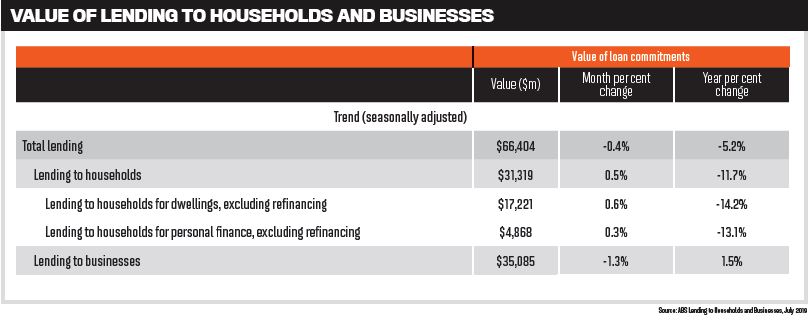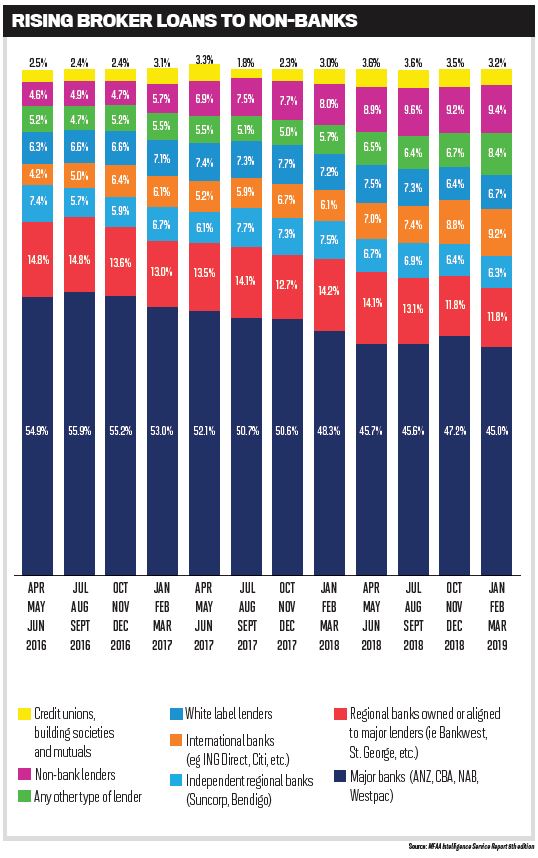With tighter credit policies and even prime customers needing help from elsewhere, non-banks are stepping up

As banks have tightened credit policies and even prime customers need help from elsewhere, five non-banks look at what the specialist lenders can offer
As banks have pulled back in certain areas and brokers are finding it increasingly difficult to source finance for their customers, nonbanks have stepped up to the plate and seen an uplift in demand.
Resimac’s general manager third party distribution, Daniel Carde, says he also puts this down to better-educated brokers: “Brokers are better aware than ever before of the ways we can help under our specialist product suite.”
Agreeing that brokers have helped the market share of non-banks grow, Pepper Money’s director, sales and distribution, Aaron Milburn, says, “Alternative finance is growing at a rapid pace as brokers and their clients have really come to embrace and understand the specialist lending category.
“As more borrowers and brokers look outside the traditional banking system, specialist lenders like Pepper are becoming an increasingly crucial part of the modern mortgage marketplace.”
As well as the rise in more borrowers deemed ‘specialist’, the non-banks have seen a growth in prime borrowers who would once have been approved by the bigger banks.
Bluestone has seen its settled volume of near prime loans grow by 269% in FY19. Clear-credit borrowers now make up more than 84% of its business.
“This is partially due to the continued conservative approach to credit assessment displayed by the mainstream lenders, which is pushing previously vanilla borrowers towards non-banks that were once reserved for borrowers with severe credit impairments,” says Bluestone head of sales Royden D’Vaz.
La Trobe Financial’s Cory Bannister, senior vice president, chief of lending officer, says the lender’s entire product suite has seen increased demand following the major banks’ “simplification strategies”, but it is most notable that the majority of loans it is approving today would have been classified as prime loans by the major banks 12 months ago.
“It is this dynamic that has been misreported in the mainstream media, who have missed the notion that the rise of nonbank market share is fuelled by ‘bank-prime’ credit, serving customers that the banks are unable to serve at this time,” says Bannister.
Q: What are you as a lender doing to help these borrowers?
While brokers are more aware of the products non-banks can offer their specialist borrowers, they still have a way to go in embracing this area. Some brokers still have a fear of helping borrowers who might be self-employed or working casually.
Liberty’s group sales manager, John Mohnacheff, says he is working to encourage brokers to not be afraid and to engage with their customers so they can understand their situations and find a solution.
“We always understand that lending has never been one size fits all. We live in a world of grey. The more we help and train and promote grey solutions the better it will be for brokers to embrace it and not be afraid of it. We’re really stressing the importance of the broker being there for all customers,” Mohnacheff says.
The kinds of borrowers who need specialist loans could include those who are selfemployed or casual workers, or those who have had credit problems in the past. This is why it is important for brokers to have that conversation with their customer so they know the best option for them.
Resimac’s Carde says it may even be that the nature of the loan requires a specialist lender, for example a larger loan at a higher loan-to-value ratio or when a shorter-term solution is needed for a customer on their path back to prime lending.
“For those borrowers who may have experienced one of life’s speed bumps, we have updated our policy to cater for credit events, rather than counting individual credit bureau listings, and we now accept recently discharged bankrupts on our Resimac Specialist Clear product, the lowest-rate product within our specialist suite,” Carde says.
“This change has resulted in eligible borrowers paying a lower interest rate than they would have previously, making the transition back to prime lending that little bit easier financially.”
At La Trobe Financial, Bannister says it is the lender’s “core purpose” to serve the underserved consumers, and therefore it works hard to fill the growing gaps.
“When for whatever reason the banks narrow their lending spectrum as we’ve seen recently, we are ready to assist,” he says.
“One of our greatest strengths is stability. We have maintained product availability, a consistent credit policy and, above all else, a bespoke personal service proposition that has been scaled with business growth, in a time when others have scaled back or withdrawn from market segments completely.”
Q: How are you ensuring that service and turnaround times are not affected by any changes in lending?
With the increased business going to these non-banks, they are working to meet the same standards brokers have always expected of them.
As there is more work and increased compliance, it would be no surprise to find that turnaround times were suffering. However, according to this year’s Brokers on Non-Banks survey, brokers are mostly positive about turnaround times. Pepper Money won the top spot in this category for its consistent and impressive service.
“We forward-plan our credit team’s capacity so that we can always provide brokers and, importantly, their clients, a streamlined service level,” Milburn says.
“This way we ensure that the broker’s brand is maintained in front of their client, and the borrower can enjoy an undisrupted process where they don’t have to anxiously wait for delayed answers and outcomes.”
D’Vaz says Bluestone’s key priority for this financial year was to maintain service levels and turnaround times throughout the significant growth it has seen.
“To achieve this, we continuously seek to improve internal processes and levels of staff training,” he explains.
“We also significantly expanded our head count over the past 18 months. As a result, even as application volumes increased, we managed to actually decrease our average time to settlement by a full business day between FY18 and FY19.”
Technology is also playing a big part in helping lenders maintain their service levels. Liberty has a platform, Liberty IQ, which allows brokers to log on at any time of the day or night so they can access the loan file and check progress. And Resimac has teamed up with Salesforce to automate its onboarding and internal loan tracking capability.
“In turn, this has allowed us to streamline the overall process from application to settlement. Any changes in lending can be easily be integrated into our processes, and we’ve consistently managed to process specialist applications within one day,” Carde says.
Q: How are you ensuring you remain compliant when it comes to specialist lending?
The increased business puts pressure not only on service levels and turnaround times but also on credit managers – especially at this time – to check applications with a particular focus on compliance.
Mohnacheff says Liberty has always been a conservative underwriter and will never cut corners to speed things up.
“Our job is to get a yes, but never to the detriment of our principles, which is to do the right thing by the customer,” he says. “It doesn’t mean we’re not courageous, but we’re very conservative in the way we assess deals. Everything is done in-house; every loan is assessed on its own merits.”
At La Trobe Financial, the level of compliance remains consistent across the lending spectrum. Bannister says it is the same whether the loan application is for prime or for specialist customers.
“The same responsible lending guidelines apply to both credit providers and credit assistance providers, requiring each to make reasonable enquiries as to the borrower’s financial situation, objectives and requirements. Having said that, the depth of analysis required may change depending on the individual circumstances of each applicant,” Bannister says.
Rather than relying on automated processes for credit decisions, Pepper individually assesses each loan, and its use of risk-based pricing means that it can be more flexible with its credit policy than other lenders.
“This flexibility does not make us non-compliant. We simply have an appetite and flexibility to cater for a broader range of clients,” Milburn says.
Q: Following the draft NCCP Amendment (Mortgage Brokers) Bill, what does ‘best interests’ mean to you?
Treasury released its reforms for the mortgage broker best interests duty and remuneration at the end of August. When in effect, the legislation will provide an obligation for mortgage brokers to act in the best interests of their customer, but what does the term ‘best interests’ mean?
First and foremost, says Bluestone’s D’Vaz, a thriving broker industry is in the best interest of the consumer, and thus, moving forward, any legislation must be carefully considered to support rather than hinder the market.
In terms of individual transactions, he says it is not just about interest rates.
“We believe that it’s in the best interest of a borrower to be offered those loans that best suit their needs and objectives given their individual circumstances, which is not always a rate-driven decision,” he says.
“Factors like whether a lender can settle the loan in a given time frame, or accept all available income sources, or allow for flexibility when verifying income, all play an important part, among many others.”
It is up to the broker to have the right conversations with the borrower in order to determine which of those factors might be best for their situation. And when a conflict arises, the needs of the client should always be put first, says Pepper’s Milburn.
“To me, it means offering your client a loan that is affordable to them, meets their specific goals, and is done in a compliant manner,” he says.
“For most brokers, the legislation should not make too much of a difference to their day-to-day work. As Pepper has always suggested, if a broker is properly documenting their client’s circumstances and the reasons for the recommendation they are making, then they have nothing to fear.”
La Trobe Financial agrees that the cheapest price does not always mean the best product for the customer, and work needs to be done on what ‘best’ will mean.
“We believe successful brokers are placing customers’ best interests ahead of their own already and therefore see little or no disruption as a result of this change,” Bannister says.
“The definition and understanding of what constitutes ‘best’ will be integral to the successful adoption of this initiative so as not to associate ‘best’ solely with price, considering that ‘best’ can relate to a multitude of factors. Working with and educating brokers on this point is where we will be focused in the lead-up to July 2020.”
As a member of the Combined Industry Forum, Carde says Resimac is already “ahead of the game”.
“The reality is most brokers already work to this principle, and provided the amendment in its final form does not make the loan application process more complex or onerous for either the consumer or the broker then this can only be seen as a positive thing,” he says.
Industry parties have presented submissions to Treasury ahead of the 4 October deadline as a more defined structure is worked towards.
Mohnacheff says it needs to be clear that a decision is in the best interests of the customer at the time of assessment, because “no one can predict the future”.
“At the time of the assessment, were we doing everything right to make sure we didn’t put that individual into hardship?”
Sometimes it is necessary to have unpleasant conversations, Mohnacheff says, but everything possible needs to be done to stay across the regulatory changes.
“We have standard operating procedures, and we just don’t divert from them because we know if, God forbid, something happens, we can say in front of the judiciary: this is our process, this is how we do it every time and this is how we apply it,” he says.
Q: What do brokers need to know about dealing with specialist borrowers?
Not all borrowers have a perfectly clean credit or repayment history, and not all borrowers have their financials completed, says Carde, but this doesn’t mean they are not worthy of assistance.
“When talking to a borrower who may not qualify for a traditional prime loan, it is important that the broker keeps an open mind and remains empathetic towards the borrower’s needs,” he says.
“For brokers not familiar with specialist lending, the best place to start would be to make some time to sit down with one of our experienced BDMs who can educate them on the various solutions that we offer.”
Milburn adds that it is not just borrowers who have had a credit event who might need a specialist loan. Specialist lenders aim to help borrowers who fall outside of the traditional lenders’ prime parameters – and this is an “ever-expanding cohort”.
“With traditional banks becoming more difficult to deal with, clients are looking for someone who understands them and is willing to take a look at their unique situation,” Milburn says.
“A self-employed borrower may not have a consistent income, but when provided with a workable solution they often become a broker’s biggest advocate. They are much ‘stickier’ clients with more regular finance needs.”
The first thing brokers should do with their specialist borrowers is “listen carefully and have an open mind”, says Bannister.
He adds that they should ask for the full truth about the customer’s financial objectives and position, complete reasonableness tests on income and expenses, and speak to the lender early on to run scenarios by the team.
“The key is to understand the borrower’s situation in detail and be able to communicate that clearly to us as the lender. The more information we have upfront, the quicker and easier we can provide a solution,” Bannister says.
Mohnacheff adds that it’s important to get rid of the label ‘specialist’ and the mindset that goes with it.
“We have a specialist way we assess the loan, but that borrower is a home loan borrower or a car loan borrower or a loan borrower. It doesn’t matter where they sit on the credit spectrum,” he says.
Q: What role do non-banks play, considering that the lending landscape has changed over the last 18 months?
With the share of loans going to non-banks increasing and more borrowers needing alternative solutions, the non-bank sector looks set to grow.
“The need for more diverse solutions than the big banks can provide is nothing new and will always exist. Non-banks like Bluestone exist to provide solutions for a broader set of borrowers and offer choice to consumers who may otherwise be left with no way forward,” says D’Vaz.
The volume of loans has been consistently dropping in parallel with banks’ changing credit policies, but the Australian economy needs the flow of credit to continue.
“With this in mind, we have a job to do,” says Bannister.
“Non-banks must continue to scale and rise to the challenge, committed to the purpose of providing fi nancial solutions to underserved markets – it is a case of ‘your country needs you’.”
Despite the challenges and the changes seen in recent times, Mohnacheff says it has never been a better time to be a broker.
“It’s never been a better time to be the champion of the consumer. It’s never been a better time to get out there and help more customers,” he says.
Echoing that sentiment, Milburn points out that the appeal of specialist lenders is far greater than many brokers realise.
“As long as the banks’ appetite to lend more broadly continues to diminish, the opportunity exists for alternative lenders to fi ll that gap,” he says.
“Regardless of market conditions, there are always willing buyers, sellers and refi nancers in the market.”
Carde agrees, saying the market has become “significantly” more favourable towards non-traditional brands.
“This has led to brokers and borrowers further embracing the non-bank proposition. Whilst we have been saying this for a long time, non-bank lenders really do provide a genuine alternative to the more well-known brands, and that has never been more true than in recent times,” Carde says.





